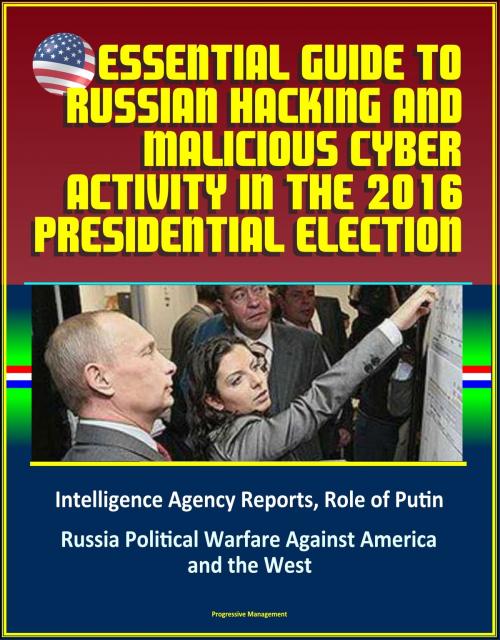Essential Guide to Russian Hacking and Malicious Cyber Activity in the 2016 Presidential Election, Intelligence Agency Reports, Role of Putin, Russia Political Warfare Against America and the West
Nonfiction, History, Asian, Russia, Social & Cultural Studies, Political Science, International| Author: | Progressive Management | ISBN: | 9781370482030 |
| Publisher: | Progressive Management | Publication: | January 8, 2017 |
| Imprint: | Smashwords Edition | Language: | English |
| Author: | Progressive Management |
| ISBN: | 9781370482030 |
| Publisher: | Progressive Management |
| Publication: | January 8, 2017 |
| Imprint: | Smashwords Edition |
| Language: | English |
This is a comprehensive compilation of breaking government reports and congressional testimony regarding the assessment of the U.S. intelligence community, including the CIA, FBI, and NSA, that Russia and Vladimir Putin engaged in cyber attacks and propaganda to influence the outcome of the 2016 Presidential election between Donald Trump and Hillary Clinton. The January 2017 report, Assessing Russian Activities and Intentions in Recent US Elections, states: We assess Russian President Vladimir Putin ordered an influence campaign in 2016 aimed at the US presidential election. Russia's goals were to undermine public faith in the US democratic process, denigrate Secretary Clinton, and harm her electability and potential presidency. We further assess Putin and the Russian Government developed a clear preference for President-elect Trump. We have high confidence in these judgments. We also assess Putin and the Russian Government aspired to help President-elect Trump's election chances when possible by discrediting Secretary Clinton and publicly contrasting her unfavorably to him.
This compilation also includes an informative study, Russian Political Warfare: Origin, Evolution, and Application - Comprehensive Study of Putin's Hybrid Warfare Campaigns Against United States and the West, Crimean Annexation, Ukraine, Gerasimov Model.
Russia's annexation of the Crimean Peninsula in 2014 and subsequent activities in Eastern Ukraine are not isolated incidents, but rather a new form of hybrid war, or asymmetric warfare. They are part of a decades-long and continent-spanning Russian political warfare (PW) campaign. Analysis of the origin, history, and evolution of Soviet/Russian PW from 1917 through today reveals that Russia is using PW to assert regional dominance and challenge the unipolarity of the United States and the West. A review of events in Ukraine demonstrates Russia is using its latest evolution of PW doctrine, the Gerasimov Model, to achieve strategic objectives while remaining below the military response threshold of the international community. This paper combines an empirical and case study review of PW, with lessons from the Cold War, to propose a conceptual framework and a supporting model for foreign policy makers, planners, and practitioners to better understand PW. Furthermore, it recommends the United States adopt a proactive PW strategy to support national policy objectives and counter the PW activities of Russia and other rising powers. United States Special Operations Forces are well-suited for PW and will play a pivotal role in a U.S. PW strategy that encompasses all elements of national power and synchronizes the interagency community.
Russia's PW affects U.S. national interests in three ways: it threatens the North Atlantic Treaty Organization (NATO), it destabilizes the global security status quo, and demonstrates that constitutional democracies are vulnerable to PW strategies. NATO's members are guaranteed collective defense against armed aggression, but NATO members in Eastern Europe fear that Russia's current tactics can undermine their sovereignty and redraw their borders without triggering an armed NATO response. As the quintessential status-quo power, U.S. interests are at stake in maintaining the balance of power within, and respect for, the current international system of laws, regulations, and traditions.
Russia is demonstrating the effectiveness of using PW strategies to target constitutional democracies. If this trend is not reversed, then it will be repeated in other situations by different actors. America must successfully oppose Russian PW to prevent it from becoming the strategy of choice for emerging regional or global powers opposed to U.S. interests.
This is a comprehensive compilation of breaking government reports and congressional testimony regarding the assessment of the U.S. intelligence community, including the CIA, FBI, and NSA, that Russia and Vladimir Putin engaged in cyber attacks and propaganda to influence the outcome of the 2016 Presidential election between Donald Trump and Hillary Clinton. The January 2017 report, Assessing Russian Activities and Intentions in Recent US Elections, states: We assess Russian President Vladimir Putin ordered an influence campaign in 2016 aimed at the US presidential election. Russia's goals were to undermine public faith in the US democratic process, denigrate Secretary Clinton, and harm her electability and potential presidency. We further assess Putin and the Russian Government developed a clear preference for President-elect Trump. We have high confidence in these judgments. We also assess Putin and the Russian Government aspired to help President-elect Trump's election chances when possible by discrediting Secretary Clinton and publicly contrasting her unfavorably to him.
This compilation also includes an informative study, Russian Political Warfare: Origin, Evolution, and Application - Comprehensive Study of Putin's Hybrid Warfare Campaigns Against United States and the West, Crimean Annexation, Ukraine, Gerasimov Model.
Russia's annexation of the Crimean Peninsula in 2014 and subsequent activities in Eastern Ukraine are not isolated incidents, but rather a new form of hybrid war, or asymmetric warfare. They are part of a decades-long and continent-spanning Russian political warfare (PW) campaign. Analysis of the origin, history, and evolution of Soviet/Russian PW from 1917 through today reveals that Russia is using PW to assert regional dominance and challenge the unipolarity of the United States and the West. A review of events in Ukraine demonstrates Russia is using its latest evolution of PW doctrine, the Gerasimov Model, to achieve strategic objectives while remaining below the military response threshold of the international community. This paper combines an empirical and case study review of PW, with lessons from the Cold War, to propose a conceptual framework and a supporting model for foreign policy makers, planners, and practitioners to better understand PW. Furthermore, it recommends the United States adopt a proactive PW strategy to support national policy objectives and counter the PW activities of Russia and other rising powers. United States Special Operations Forces are well-suited for PW and will play a pivotal role in a U.S. PW strategy that encompasses all elements of national power and synchronizes the interagency community.
Russia's PW affects U.S. national interests in three ways: it threatens the North Atlantic Treaty Organization (NATO), it destabilizes the global security status quo, and demonstrates that constitutional democracies are vulnerable to PW strategies. NATO's members are guaranteed collective defense against armed aggression, but NATO members in Eastern Europe fear that Russia's current tactics can undermine their sovereignty and redraw their borders without triggering an armed NATO response. As the quintessential status-quo power, U.S. interests are at stake in maintaining the balance of power within, and respect for, the current international system of laws, regulations, and traditions.
Russia is demonstrating the effectiveness of using PW strategies to target constitutional democracies. If this trend is not reversed, then it will be repeated in other situations by different actors. America must successfully oppose Russian PW to prevent it from becoming the strategy of choice for emerging regional or global powers opposed to U.S. interests.















